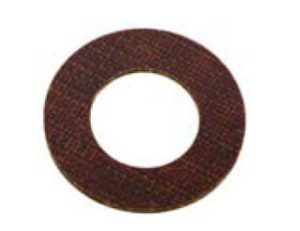
Washers are commonly used to protect parts from the load of threaded bolts. When driving a bolt into a part, you’ll expose the part to mechanical stress. The head of the bolt will press against the upper surface of the part, resulting in stress. Depending on how much stress the part is exposed to, the part may crack or otherwise sustain damage.
Washers are designed to protect parts from damage such as this by distributing the bolt’s load across a larger surface area. The load of the bolt will spread across the washer. While most washers are metal, however, some are non-metallic. To learn more about non-metallic washers and how they work, keep reading.
Overview of Non-Metallic Washers
Non-metallic washers are characterized by their use of a non-metallic material. You can find washers made of a variety of materials. Some of them are made of metal, such as stainless steel, aluminum or brass. Non-metallic washers are made of a synthetic material.
Common materials used in the construction of non-metallic washers include the following:
- Nylon
- Rubber
- Plastic
- Fiberglass
Applications for Non-Metallic Washers
What are non-metallic washers used for exactly? They are often used to distribute the load of a bolt — just like metal washers. They can protect parts from stress-induced damage by distributing the bolt’s load across a larger surface area.
When made of a non-metallic material, washers can provide electrical insulation. All metals can conduct electricity. This is due to the fact that free electrons move around in metal, which allows electricity to flow through metal with minimal resistance. Some metals are more conductive than others, but they can all conduct electricity. Non-metallic materials, though, offer electrical insulation.
Non-metallic washers designed for use in applications are known as insulating washers. They are commonly used in electrical devices and equipment. Thanks to their use of a non-metallic material, they won’t conduct electricity.
Non-metallic washers are often used as seals as well. Depending on the specific type of non-metallic material from which a washer is made, it may exhibit elastomeric properties. The washer may compress under the load of a bolt, thus creating a water- and air-tight seal.
Medical devices often contain non-metallic washers. Metal washers are reactive and, therefore, can corrode and degrade over time. Non-metallic washers, on the other hand, are non-reactive. They offer better resistance to chemicals, and they offer better biocompatibility than their metal counterparts.
In Conclusion
1
1
1



